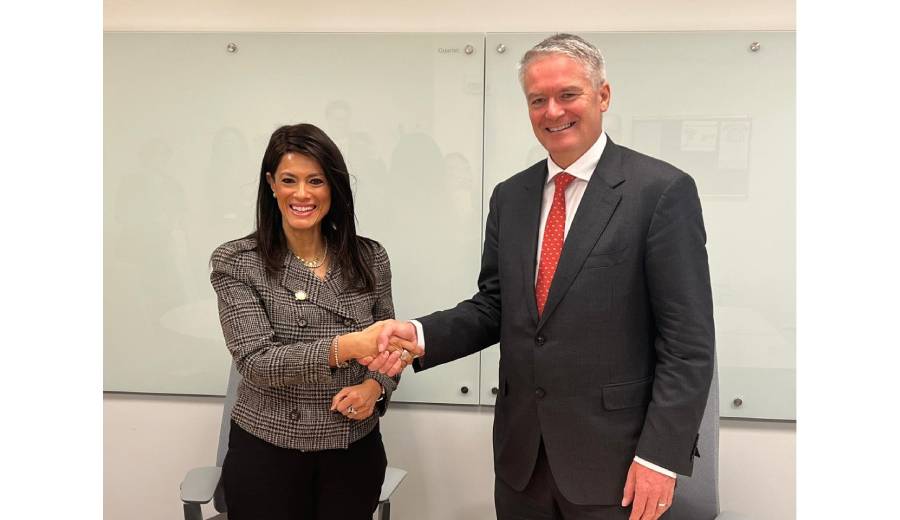Egypt Assumes Co-Chairmanship of the MENA-OECD Initiative on Governance and Competitiveness for Development

07 May 2025
Al-Mashat: Egypt plays a pivotal role in strengthening multilateral cooperation and advancing bilateral and regional partnerships to enhance policy-making for economic development
H.E. Dr. Rania A. Al-Mashat, Minister of Planning, Economic
Development and International Cooperation, announced that Egypt has officially
assumed the co-chairmanship of the MENA-OECD Initiative on Governance and
Competitiveness for Development, succeeding Tunisia. Egypt will serve as
co-chair for the 2026–2030 period, alongside Italy and Turkey.
This announcement came during the Steering Committee meeting
held in France, under the theme: “Addressing Global Transformations in the MENA
Region.”
The MENA-OECD Initiative on Governance and Competitiveness
for Development was launched in 2005 to foster cooperation between MENA
countries and the OECD, aimed at promoting sustainable and inclusive growth
policies.
The initiative supports joint efforts between governments,
the OECD, civil society, and the private sector to address regional challenges
and advance development priorities, including women’s empowerment, job
creation, and more.
During the event, H.E. Dr. Al-Mashat delivered an opening
speech, she emphasized the importance of the initiative, launched nearly 20
years ago to establish a shared vision aligned with the region’s priorities and
aspirations.
H.E. Minister Al-Mashat noted that as the initiative enters
a new phase (2026–2030), Egypt is firmly committed to multilateral cooperation
and enhancing partnerships across the MENA region through knowledge exchange
and evidence-based policymaking.
H.E. Dr. Al-Mashat expressed appreciation for Tunisia’s
leadership during the previous term and affirmed Egypt’s dedication to
continuing and strengthening regional cooperation. She affirmed the importance
of renewing the initiative’s mandate to make it more inclusive and flexible,
stating: “We are here today to renew our commitment to collective action. Egypt
stands ready to support the initiative as a platform for dialogue and policy
development, capable of anticipating the future and fostering inclusive
prosperity in our region.”
H.E. Dr. Al-Mashat outlined key areas of cooperation between
Egypt and the OECD, particularly since the launch of the OECD Country Programme
in Egypt in 2021. This program focuses on five main pillars: inclusive economic
growth, innovation, governance, statistics, and sustainable development. It
comprises 35 projects aligned with Egypt’s Vision 2030 and the National
Structural Reform Program.
H.E. Minister Al-Mashat added, “As we discuss responding to
global transformations in the MENA region today, we must underscore the crucial
role of bilateral and regional cooperation in addressing emerging global
challenges. Such cooperation helps shape progress and strengthens collective
expertise to build resilience.”
H.E. Dr. Al-Mashat also highlighted that the Country
Programme has become a strategic tool supporting national reforms, capacity building,
and the exchange of policies and best practices across the region.
H.E. Dr. Al-Mashat pointed out that digital transformation
and artificial intelligence (AI) are among the most promising fields for joint
cooperation within the Country Programme. Through the innovation pillar, the
OECD provided technical support for launching the second edition of Egypt’s
National AI Strategy.
H.E. Minister Al-Mashat emphasized Egypt’s central role in
fostering regional AI cooperation, as chair of both the African Union AI
Working Group and the Arab League AI Working Group, leading efforts to develop
AI strategies across the continent.
Another key area of cooperation with the OECD is trade
integration and value chains, with Egypt actively participating in the
"Trade in Value Added" initiative. Egypt is keen to strengthen its
position in regional and global value chains and share expertise with African
countries to enhance trade integration.
H.E. Dr. Al-Mashat highlighted joint efforts to economically
empower women, noting Egypt’s regional leadership in launching the Gender Gap
Accelerator with the World Economic Forum. The accelerator aims to promote
women’s economic empowerment, financial inclusion, and entrepreneurship. In
November 2024, Egypt hosted the launch of a joint EU-OECD project on financial
inclusion for women in the Southern Mediterranean.









